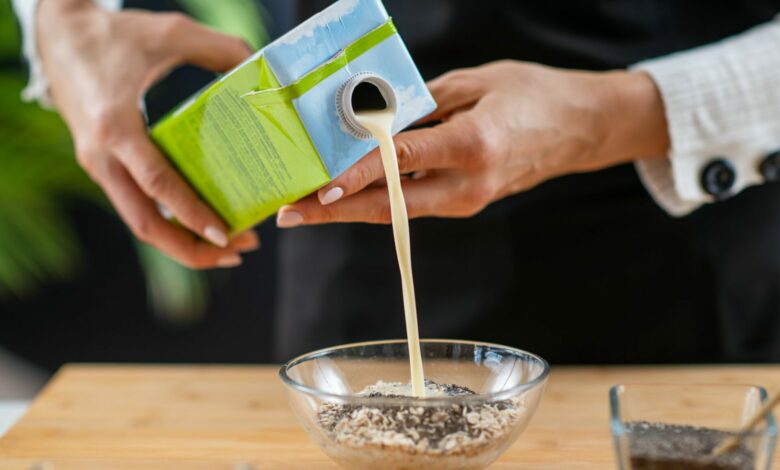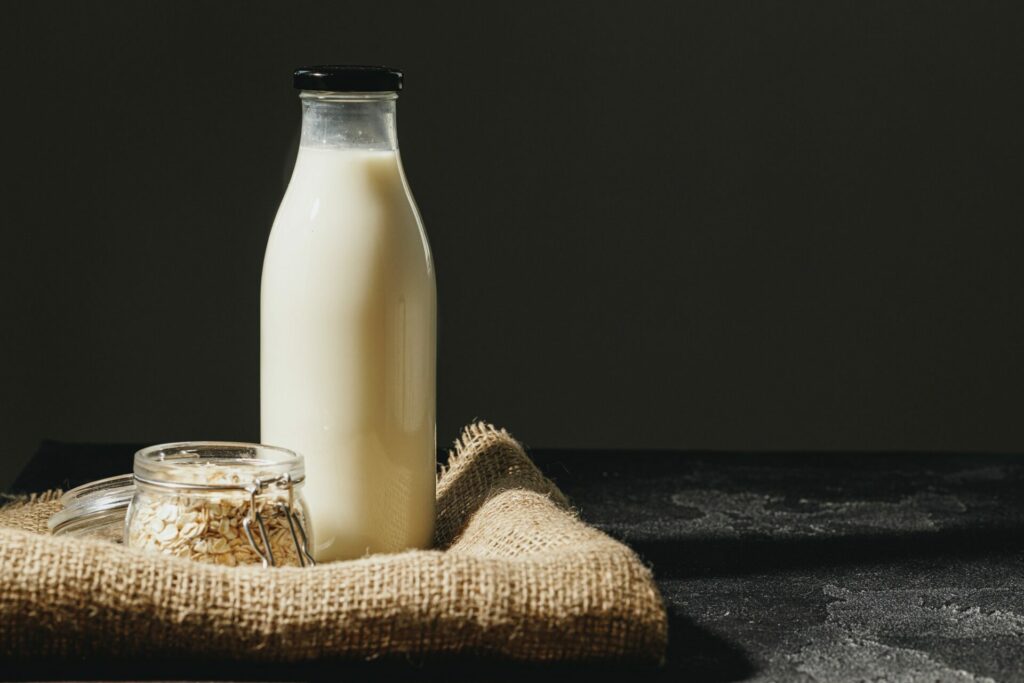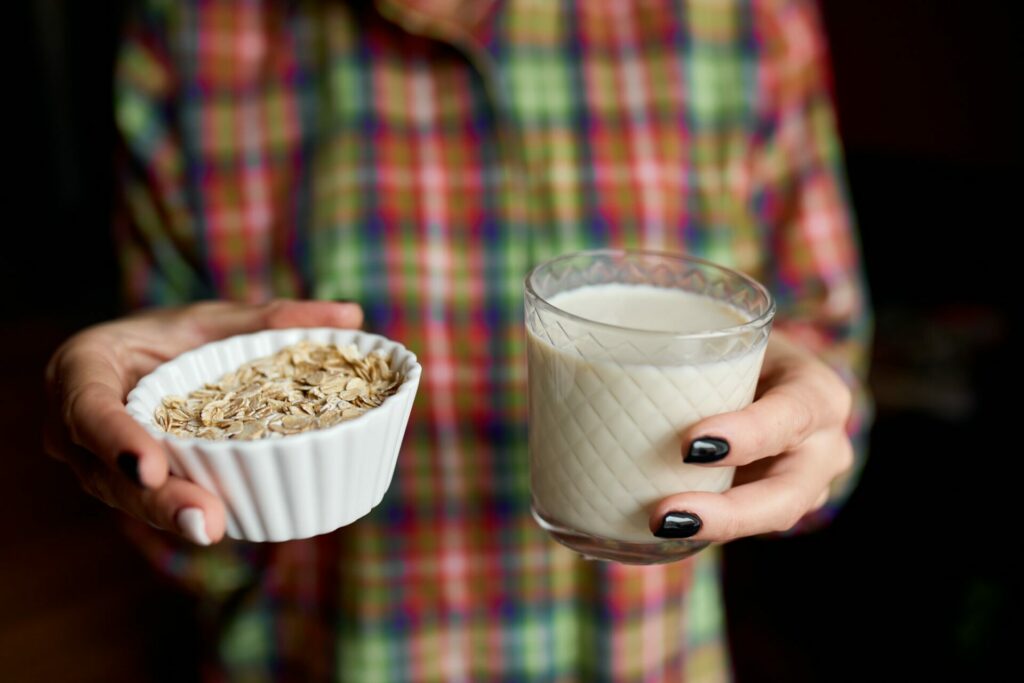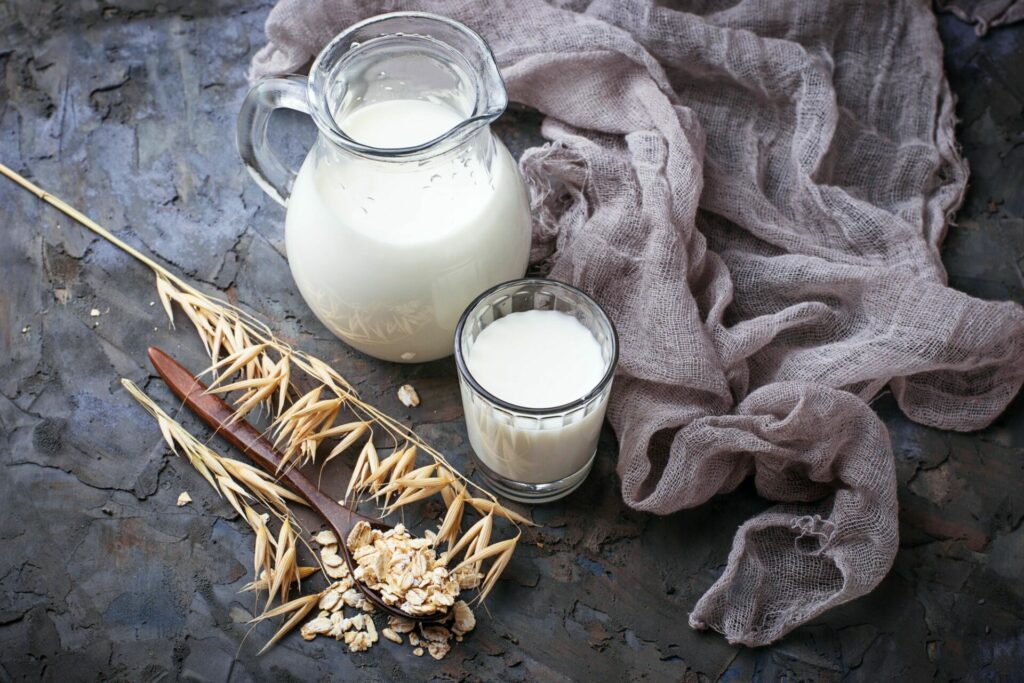
The obsession of people with healthy living is phenomenal. To which large businesses are filling up their pockets. Gone are the days when milk was just milk. In the meantime, specifying the milk has become necessary. Because people are now more aware and on the constant lookout for healthier alternatives, and cruelty-free and vegan options. For that reason, a variety of new products are popping up in the market. The latest to enter the grocery store is the oat milk.

For vegans and lactose intolerants, a myriad of milk options are filled in supermarket fridges. Some of them include soy, almond, cashew, pecans, and hemp seed milk. As of now, oat milk has found its spot among them. It is labeled as a nutritious, affordable, non-dairy, cruelty-free, vegan and sustainable milk (mylk) option. Before moving ahead let’s dig deeper about the oat milk. In this article, we’ll be shedding light on oat milk benefits, oat milk nutrition and oat milk dangers.
What is Oat Milk?
Oat milk is likely originated from a 27-year-old Swedish company, Oatly. It is made from oats soaked in water, blending, and straining. It is a plant-based vegan milk (mylk) alternative, free of dairy, nuts, soy, and lactose. Oat milk has a creamy texture and mild sweetness. It is packed with nutritional values essential vitamins and minerals.
Nowadays, it’s commonly used in coffee, and cereals as an alternative to traditional dairy milk. Being highly processed in nature, it contains stabilizers and thickeners for smooth texture.
How is Oat Milk Made?
Well, making oat milk isn’t rocket science. Oat milk can be easily made at home and is cheaper than store-bought options. Also, you can customize the ingredients as per your demands. Which can help you to avoid thickeners and additives used in packaged oat milk. You can even go for gluten-free oats to make it gluten-free.
Here’s the guide to homemade oat milk in a few minutes.

- Blend a cup of rolled oats with 3 cups of cold water for thirty seconds.
- Use a cheesecloth to strain the mixture into a bottle or glass
- Lift the cheesecloth carefully to form a sac, now gently squeeze the remaining liquid in the glass.
Moreover, to enhance the flavor, add a little vanilla, cinnamon extracts, a few dates, a pinch of salt, and maple syrup honey to blend it further. You can store it in the refrigerator for almost 5 days. Try using cold water to avoid sliminess, and do not squeeze the cheesecloth tightly to drain the remaining liquid.
Benefits of Oat Milk
Although the oats are very nutritious when free from additives and thickeners. But the packaged one can take a toll on your health. So, let’s discuss oat milk benefits in detail.
1. Vegan and Lactose Free
Oat milk can be appreciable for those with dietary restrictions. For individuals concerned with lactose, soy, and nuts, it is a go-to option. Since its sole ingredient is oats and water, the chances of being unhealthy are minuscule.
As oats are gluten-free they can be contaminated with excessive processing. So make sure to go for certified gluten-free oats. Besides this, gluten-free oats can be used for homemade oat milk.
2. Packed with B Vitamins
Oat milk is regarded as a great source of vitamin B12 and riboflavin. Which is often linked with good health and benefits.
For instance, oat milk is subjected to deal with oxidative damage, alleviate stress, to boost healthy hairs, skin, and nails.
3. Lower Bad Cholesterol
Oats being high in beta-glucan, soluble fiber can potentially cater to heart health benefits. It forms a gel-like texture in your gut by binding to cholesterol to lower its absorption. This controls the blood cholesterol level. Which mitigates the cardiac risk. One cup of oat milk contains 1.2 grams of beta-glucan.
4. Promotes Bone Health
Oat milk is loaded with calcium and vitamin D, both are great for bone. Perhaps calcium plays a vital role in the development of bones. Over time ignoring the calcium-rich diet can lead to brittleness and prone to being fractured.
Similarly, vitamin D is just as important as calcium in your diet. It promotes the absorption of calcium within the body. A lack of vitamin D refrains the body from extracting enough calcium making it weakening the bones.
There are plenty of commercial oat milk options rich in Vitamin B12. Which also supports bone health. But remember, though the homemade oat milk lacks Vitamin D or B12. Only packaged oat milk is rich in vitamins.
5. Supports Immune System
Oats contain bioactive peptides which enhance the immune system. It supports innate immunity (first response to foreign substances) and adaptive immunity (immune cells to destroy foreign substances). The exact mechanism of peptides assisting the immune system is still unknown. Research is still to be done to determine the effect of oat milk on the immune system.
Oat Milk Nutrition
As discussed oat milk is nutrient-dense. It is loaded with vitamins, fibers, and minerals. Now, let’s figure out the nutrition facts of one cup of oat milk.

Calories: 120
Protein: 3 grams
Carbs: 16 grams
Fat: 5 grams
Dietary fiber: 2 grams
Vitamin B12: 50% of the Daily Value (DV)
Calcium: 25% of the DV
Riboflavin: 45% of the DV
Phosphorus: 20% of the DV
Vitamin A: 20% of the DV
Vitamin D: 20% of the DV
Iron: 2% of the DV
Potassium: 8% of the DV
Dangers of Packaged Oat Milk
While oat milk has elaborated benefits, it also has potential downsides as well. Let’s figure them out.
- Most packaged oat milk is sweetened or flavored. High-added sugar can jeopardize your health. It’s better to stick with the unsweetened one whenever possible.
- Additionally, most packaged oat milk isn’t certified gluten-free, which can cause digestive issues and bloating.
- Remember homemade oat milk isn’t thick like packaged oat milks. It often seems to be oat water.
- Oat milk incorporates less protein than traditional dairy alternatives. As a result, it’s less filling.
- Packaged oat milk or oat drink contains rape seed oil (canola oil), which is really harmful for our health. It’s like drinking oil inside a mixture of oats, sugar and water.
- Another downside is the cost. The oat milk is more expensive than cow’s milk. So it’s better to do it at home.
However, the ingredients mentioned above would be enough to conclude whether oat milk is an option. Packaged oat milk might look appealing but you must be conscious. Supermarket fridges store a myriad of brands. Picking things randomly might take a toll on your health. Oats are naturally gluten-free but sometimes they can be contaminated as they are processed under the same facility as gluten-containing foods. For that reason, sticking to a home-made one can be an option. Double-check the ingredients list to mitigate risk if you are allergic to any substance.
Oat milk is a good option since it’s vegan, cruelty-free and healthy, but packaged oat milk speaks a different story. If you’re really concerned about your health, you must either start preparing your oat milk at home or be very cautious about what goes in the making of your favourite brand’s oat milk and choose accordingly. Eat healthy, live healthy!



